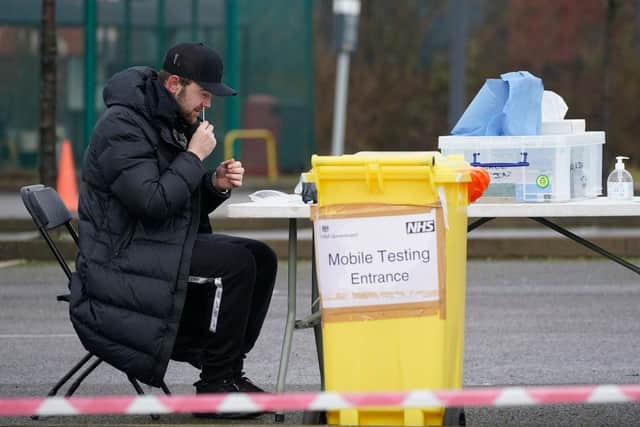Delta variant may have higher risk of serious illness as Covid cases jump to highest since February
Up to 75 per cent of the 992 new cases reported on Friday are believed to be of this strain, previously known as the India variant, which has now become dominant in Scotland and the UK.
It is the highest number of cases reported in a day for Scotland since February 17.
Advertisement
Hide AdAdvertisement
Hide AdThe rising cases come amid reports that a mutation of the Delta variant detected in Nepal may have some resistance to vaccines, but more research is needed and neither the Scottish Government nor the World Health Organisation has yet raised the alarm.


Scotland is at a “critical juncture” in the fight against Covid-19, Ms Sturgeon said yesterday, ahead of restrictions easing in some areas.
While some areas move to level one and islands dropping to level zero, 14 council areas have been kept in level two restrictions longer than planned, including Edinburgh, Dundee, Lanarkshire and Renfrewshire.
Glasgow enters level two today, after being held in tighter restrictions than the rest of the country over higher case numbers.
The city is set to host the Euros from this coming Friday, with up to 6,000 football fans each day watching games on big screens in fan zones at Glasgow Green, and 12,000 fans at Hampden Park for four matches.
The Scottish Licensed Trade Association (SLTA) has hit out at plans for the fan zones, which it argues contradict the cautious approach to easing of restrictions for pubs and restaurants, and will draw trade away from struggling businesses.
Edinburgh University's Dr Christine Tait-Burkard said allowing fans to gather would be a "risk" and urged the government to “rethink” the lack of mandatory testing.
Ms Sturgeon said there were “ethical issues” about obligatory testing, adding that measures in place for the Euros were “under constant review”.
Advertisement
Hide AdAdvertisement
Hide AdThe First Minister also said comments this week from health secretary Humza Yousaf about the risk of children being hospitalised with Covid were not meant to “alarm” the public.
Mr Yousaf warned that parents crossing council borders to bring children to soft play risked youngsters being hospitalised with Covid, while Deputy First Minister John Swinney added that “high” numbers of children have been admitted to hospital with the virus recently.
The claim was refuted by the Royal College of Paediatrics and Child Health. Mr Yousaf later apologised for the statement.
In its latest monitoring report, Public Health England stated the Delta variant of Covid-19 may increase the risk of hospitalisation, although more data is needed to confirm this.
Analysis of 38,805 cases in England showed the Delta variant had a 2.61 times higher risk of hospitalisation within 14 days of specimen date than the Alpha variant, and a 1.67 times higher risk of admission to A&E.
However, academics have warned these findings are not yet confirmed.
Ian Jones, professor of virology at Reading University, said the results should be taken with a “big dose of salt”.
"It is possible, but not yet proved,” he said.
Dr Julian Tang, clinical virologist at Leicester University, urged caution in the easing of restrictions in light of increasing numbers of cases of the variant.
Advertisement
Hide AdAdvertisement
Hide AdBut he said: “We’ve been here before with the Kent (alpha) B.1.1.7 variant – where there was an initial belief that it was more transmissible, which eventually turned out to be true, and more clinically severe, which eventually turned out to be false.”
Latest case numbers for the Delta variant in Scotland are believed to be around 1,500, but the true figure is likely to be higher.
Around 65 to 75 per cent of the 992 new cases reported in Scotland yesterday are “almost certainly” this variant, national clinical director Jason Leitch said.
There is no evidence to suggest the variant has more of an effect on younger people, he added.
“We are seeing it dominate,” he said. “That's exactly what we expected to happen. We predicted it from this podium.”
Prof Leitch added: “There isn’t any indication that this particular variant is worse in children. Proportionately, more young people are becoming infected because we started vaccination with those who might die.
“Very simply, you have more of a population available unprotected to this virus, and therefore proportionally more young people are getting this particular variant.”
Amid reports of a “Nepal variant” that may be more resistant to vaccines, Prof Leitch said Scots should not yet worry.
Advertisement
Hide AdAdvertisement
Hide Ad“We know some mutations give the virus particular advantages,” he said.
"Some mutations give it a transmission advantage, some mutations give it a vaccine escape advantage.
“The Delta variant, the one we have just now, doesn’t have the vaccine escape mutation, but it does have the transmission mutation.”
Scientists do not yet have results, but early research suggests there may be a mutation of the Delta variant in Nepal that has the vaccine escape mutation, he said.
“This potential Nepalese variant may also have the vaccine escape mutation, that’s what got scientists worried,” he said. “It could be that it’s Delta with vaccine escape.
“You shouldn't worry about that because none of that is confirmed, but that's what is being called, the ‘Nepalese variant’.”
The Scottish Government announced on Friday that more than 60 members of the Armed Forces would be deployed from Monday to accelerate Scotland’s vaccination programme.
As of Friday, 3,326,005 people have been given a first vaccine dose, just under 75 per cent of the population, while 2,170,570 have been given a second dose, just under 49 per cent.
A message from the Editor:Thank you for reading this article. We're more reliant on your support than ever as the shift in consumer habits brought about by coronavirus impacts our advertisers.
If you haven't already, please consider supporting our trusted, fact-checked journalism by taking out a digital subscription.
Comments
Want to join the conversation? Please or to comment on this article.
